Plácido Domingo, one of the world’s greatest opera stars, has expressed sadness at an explicit rape scene staged at his beloved Royal Opera House last week. The Spanish singer, who famously performed with Luciano Pavarotti and José Carreras as the Three Tenors, told the Observer he prefers opera productions to stay close to the original intentions of the composer.
His words come in the wake of the controversy surrounding director Damiano Michieletto’s ROH production of Rossini’s opera Guillaume Tell. The opera, which opened at Covent Garden on Monday, was met with loud booing from the audience, many of whom were outraged by scenes showing an uncredited actress being violently sexually abused during a banquet, accompanied by a jaunty passage in the score.
Speaking this weekend as he prepares to bring his international singing competition, Operalia, to London for the first time, Domingo called upon directors to “respect the original ideas of the piece”.
“I love a traditional production,” he said. “You do not need to show everything. You have to leave some things to the imagination,” he added. “Sometimes some producers make that mistake and you will find that audiences start booing. I am sad the performance of William Tell had this reaction. It is very sad because Michieletto is a great producer. I have seen some of his productions and admired them.”
Critics were damning of the scene. “Michieletto’s decision to recast the third act ballet as a protracted and pruriently voyeuristic gang rape resulted in an immediate reaction of unprecedented anger, as sustained booing swept through the auditorium,” wrote the Guardian’s Tim Ashley.
Initially Michieletto argued: “If you don’t feel the brutality, the suffering these people have had to face, if you want to hide it, it becomes soft, it becomes for children.” Kasper Holten, director of opera at Covent Garden, defended his right to interpret the piece his own way, but on Thursday Michieletto toned down some of the sequences.
Domingo believes a director must consider his audience. “You should always remember that children might happen to be in the auditorium, or people with certain moral ideas who are going to find it difficult. As a director of opera at Los Angeles I am always aware of this and I like to keep in the period of the piece. If there is something that is very outdated then you have to treat it with respect if you change anything. You do not want to hurt anyone.”
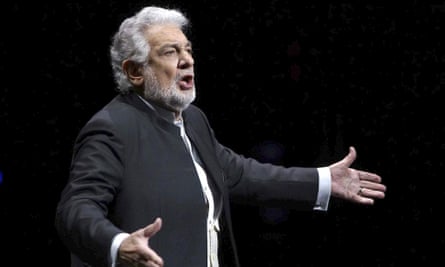
The 74-year-old singer, who now performs as a baritone and who told the Observer he is enjoying his new, deeper vocal range, recently cancelled a series of performances because of family illness. In May he pulled out of Verdi’s La Traviata at Covent Garden and then from Woody Allen’s staging of Puccini’s comic opera Gianni Schicchi in Madrid. His sister María José died early last month and it is expected Domingo will now perform in Schicchi at Los Angeles Opera in September.
But next week he arrives in London to oversee and conduct performances during his Operalia competition to find top-flight singing talent. Forty hopeful candidates, including the 31-year-old British mezzo-soprano Catherine Young, will take part in the contest, which has been running since 1993. It takes place in a different city each year and Domingo said he has long wanted to bring it to London: “Covent Garden is one of the busiest theatres in the world, especially during the summer, so it has been hard. But we said we cannot wait any longer, we really want to do it in London.”
Fondly remembering his “big screen” appearances in Covent Garden piazza, when operas such as La Bohème, Tosca and Carmen were relayed out to the general public, he said he wished the performances in Operalia could also be shown outside. “Opera can still create those big popular moments,” he said. “It creates a beautiful atmosphere, people are moving around on their way to restaurants or eating or drinking at bars.”
While he agrees with Dame Kiri Te Kanawa, who told this newspaper last year that she dislikes the sound quality when operas are screened in cinemas, he does think it finds fresh audiences for opera and allows more people to follow new work. “Certainly it is not the same experience in the cinema. Dame Kiri is right. But if it is the best you can get to, then the cinema or the big screen in the square is another kind of experience.”
Domingo believes greater access and the arrival of simultaneous translations has created a need for higher standards of acting.
“The public require it now because they have understood much more of the story in recent years. And they want to be involved with the characters,” he said.
“In the case of a really phenomenal voice the audience may just be happy to hear it, but generally they want both the acting and the voice.”
Operalia sets out to find this combination, the “complete” opera star, and it has had great success, producing singers such as Joyce DiDonato, Nina Stemme and Joseph Calleja. “I hear these new voices,” Domingo said, “and then in two months they are going into the theatres.”
So far only one British singer, Claudia Huckle, from Devon, has won a top prize. “The singers know the competition is very tough and it is not always a guarantee of success straightaway. Claudia has a very specialised voice, a beautiful contralto. I would say she and her agent need to concentrate on a very particular repertoire,” said Domingo.
Because most opera houses have training schemes now, he is optimistic about the international stars of the future. “We already have a new generation of great voices and more coming up. But not everybody will be lucky, because it is the public that will decide.”
He is still amazed that he earned a position at the top: “I really adore it. I have a passion for it, but never dreamt that I would be selected by the public to be among the really internationally known singers. I am very thankful to the public. They gave me my star sign.”
He looks back with affection to his performances with Pavarotti, who died in 2007, and with Carreras, now 68. “In five days’ time it will be 25 years ago that I first sang with Luciano and José in Rome. It was a very special time.”
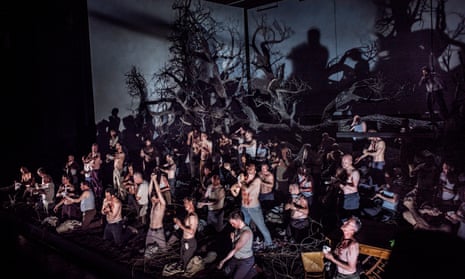




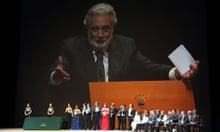
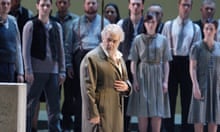

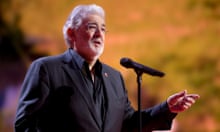
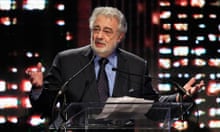
Comments (…)
Sign in or create your Guardian account to join the discussion